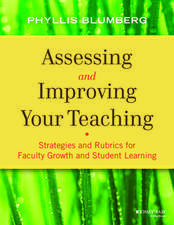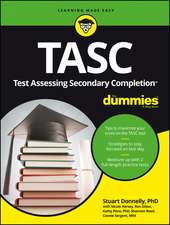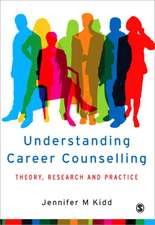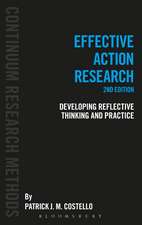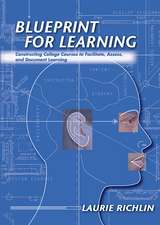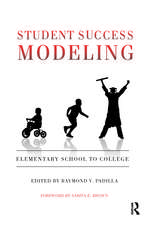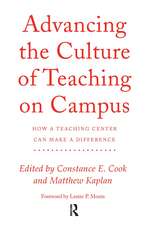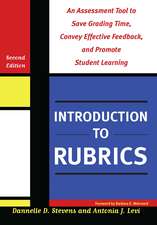Coming in from the Margins: Faculty Development’s Emerging Organizational Development Role in Institutional Change
Autor Connie Schroederen Limba Engleză Paperback – 9 noi 2010
| Toate formatele și edițiile | Preț | Express |
|---|---|---|
| Paperback (1) | 308.94 lei 6-8 săpt. | |
| Taylor & Francis – 9 noi 2010 | 308.94 lei 6-8 săpt. | |
| Hardback (1) | 1004.86 lei 6-8 săpt. | |
| Taylor & Francis – 9 noi 2010 | 1004.86 lei 6-8 săpt. |
Preț: 308.94 lei
Nou
Puncte Express: 463
Preț estimativ în valută:
59.13€ • 64.25$ • 49.70£
59.13€ • 64.25$ • 49.70£
Carte tipărită la comandă
Livrare economică 21 aprilie-05 mai
Preluare comenzi: 021 569.72.76
Specificații
ISBN-13: 9781579223632
ISBN-10: 157922363X
Pagini: 304
Dimensiuni: 152 x 229 x 23 mm
Greutate: 0.44 kg
Ediția:1
Editura: Taylor & Francis
Colecția Routledge
Locul publicării:Oxford, United Kingdom
ISBN-10: 157922363X
Pagini: 304
Dimensiuni: 152 x 229 x 23 mm
Greutate: 0.44 kg
Ediția:1
Editura: Taylor & Francis
Colecția Routledge
Locul publicării:Oxford, United Kingdom
Public țintă
PostgraduateCuprins
Introduction Part One. Calling Faculty Development to Reenvision its Role 1. Faculty Developers as Institutional Developers. The Missing Prong of Organizational Development—Connie Schroeder 2. Getting to the Table. Planning and Developing Institutional Initiatives—Nancy Van Note Chism 3. Nurturing Institutional Change. Collaboration and Leadership between Upper-Level Administrators and Faculty Developers—Devorah Lieberman Part Two. Examining the Evidence of an Organizational Development Role 4. Investigating Institutional Involvement and Change Agency—Connie Schroeder 5. Identifying the Factors that Enable an Organizational Development Role—Connie Schroeder Part Three. Repositioning Centers and Directors on the Institutional Radar Screen 6. Leading From the Middle. A Faculty Development Center at the Heart of Institutional Change—Catherine E. Frerichs, Diana G. Pace, and Tamara Rosier 7. Informing and Directing the Planning of Institutional Priorities and Initiatives—Phyllis Blumberg 8. Developing and Acting on a Center Vision Case Study Narratives—Connie Schroeder 9. Knowing and Facilitating Organizational Change Processes—Connie Schroeder 10. Optimizing Center Staffing and Advisory Boards to Promote Involvement in Institutional Change—Susan Gano-Phillips 11. Aligning and Revising Center Mission Statements—Connie Schroeder 12. Embedding Centers in Institutional Strategic Planning—Connie Schroeder Part Four. Next Steps 13. Recentering within the Web of Institutional Leadership—Connie Schroeder
Notă biografică
Connie Schroeder is Assistant Director of the Center for Instructional and Professional Development, at the University of Wisconsin, UW-Milwaukee. Phyllis Blumberg is a consultant and presenter focusing on the learning process, assessment of student learning outcomes, and effective teaching in higher education. From 1999 to 2019, she was the director of the Teaching and Learning Center at the University of the Sciences in Philadelphia, where she was also assistant provost for faculty development, as well as research professor in education and professor of psychology.
Recenzii
"This book raises the level of discussion about the valuable role that TLCs, their directors, and faculty developers can have in transforming student learning. The book comes at a time when we have reached a crossroads in the role of the TLC and its director. No longer can the TLC be marginalized if an insititution wants to be responsive to calls for academic reforms or new strategic directions. TLCs can be the key facilitatiors that bring different stakeholders together to strategize and collaborate on an organizational level, while still fulfilling their traditional roles of supporting and developing the capacity of individual faculty members.
Coming in From the Margins should be read by faculty developers and by all leaders in higher education involved in collaborative and crossfunctional initiatives relating to student learning and institutional assessments."
Miriam L. Forlow, Director of Academic Affairs, Jersey City Campus, University of Phoenix
The Review of Higher Education
“This is a remarkable work that clarifies the gradual and important transformation in faculty development that has been under way in American high education for decades, enabling us to learn from and build on the experiences, insights, and practical advice of pathfinders in our field. Dr. Schroeder provides a solid research base to this work, augmented by models, case studies and reflective practice from many of the leaders in our field who have long understood the importance of framing their faculty development roles as agents of organizational change. Connie Schroeder and her colleagues have charted this new terrain for us, recounting their triumphs as well as their challenges. They offer us a new way of thinking about our field and its future for current and future faculty developers in the U.S. and for academic and educational developers internationally. I highly recommend this valuable and thought-provoking new resource for faculty developers and the senior academic administrators with whom they work."
Deborah DeZure, Assistant Provost for Faculty and Organizational Development, Michigan State University
"No doubt about, we have entered a new era in faculty development. As our institutions face a myriad of changes, faculty developers will increasingly need to look beyond traditional instructional development boundaries to emerging organizational development roles. The pressures put on faculty developers during this time of flux are immense. Luckily, this important new book, based on original research and state-of-the-art practice, provides a cogent range of insights into what we are all experiencing. Coming in from the Margins is an indispensable and timely addition to the field that takes a hard look at where we are right now, and provides a road map for the future."
Mary Deane Sorcinelli, Associate Provost for Faculty Development, and Professor, Educational Policy, Research and Administration, University of Massachusetts Amherst
“This important volume locates a key player – the faculty development professional – in the distributed leadership needed for institutional change. The authors provide insight into becoming involved in strategic planning, mission statement development, and collaborating with administrators. Schroeder notes the wholesale change in the identity of faculty developers, and identifies key enabling factors that alter faculty developers’ role to be more central to institutional direction setting. Comprehensive, practical, inspirational, and timely - a must have book for anyone in the profession."
Adrianna Kezar, Associate Professor, Rossier School of Education, and Associate Director, of CHEPA, University of Southern California
Coming in From the Margins should be read by faculty developers and by all leaders in higher education involved in collaborative and crossfunctional initiatives relating to student learning and institutional assessments."
Miriam L. Forlow, Director of Academic Affairs, Jersey City Campus, University of Phoenix
The Review of Higher Education
“This is a remarkable work that clarifies the gradual and important transformation in faculty development that has been under way in American high education for decades, enabling us to learn from and build on the experiences, insights, and practical advice of pathfinders in our field. Dr. Schroeder provides a solid research base to this work, augmented by models, case studies and reflective practice from many of the leaders in our field who have long understood the importance of framing their faculty development roles as agents of organizational change. Connie Schroeder and her colleagues have charted this new terrain for us, recounting their triumphs as well as their challenges. They offer us a new way of thinking about our field and its future for current and future faculty developers in the U.S. and for academic and educational developers internationally. I highly recommend this valuable and thought-provoking new resource for faculty developers and the senior academic administrators with whom they work."
Deborah DeZure, Assistant Provost for Faculty and Organizational Development, Michigan State University
"No doubt about, we have entered a new era in faculty development. As our institutions face a myriad of changes, faculty developers will increasingly need to look beyond traditional instructional development boundaries to emerging organizational development roles. The pressures put on faculty developers during this time of flux are immense. Luckily, this important new book, based on original research and state-of-the-art practice, provides a cogent range of insights into what we are all experiencing. Coming in from the Margins is an indispensable and timely addition to the field that takes a hard look at where we are right now, and provides a road map for the future."
Mary Deane Sorcinelli, Associate Provost for Faculty Development, and Professor, Educational Policy, Research and Administration, University of Massachusetts Amherst
“This important volume locates a key player – the faculty development professional – in the distributed leadership needed for institutional change. The authors provide insight into becoming involved in strategic planning, mission statement development, and collaborating with administrators. Schroeder notes the wholesale change in the identity of faculty developers, and identifies key enabling factors that alter faculty developers’ role to be more central to institutional direction setting. Comprehensive, practical, inspirational, and timely - a must have book for anyone in the profession."
Adrianna Kezar, Associate Professor, Rossier School of Education, and Associate Director, of CHEPA, University of Southern California
Descriere
The core argument of this book – that a necessary and significant role change is underway in faculty development – is a call for centers to merge the traditional responsibilities and services of the past several decades with a leadership role as organizational developers.


